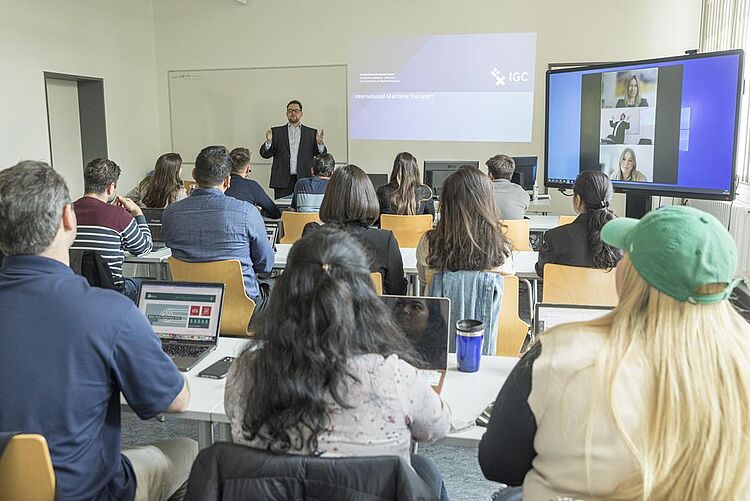Key Facts
| Abschluss | Master of Arts - 90 ECTS |
| Studienbeginn | Oktober 2024 |
| Bewerbungsfrist | 31. Juli 2024 - Jetzt bewerben! |
| Akkreditierung | Hochschule Bremen, AQAS |
| Zulassungsvoraussetzungen |
*Für Bewerber:innen aus dem Europäischen Hochschulraum (EHR) sind 210 ECTS erforderlich. Bewerber:innen aus Europa mit 180 ECTS können unter der Bedingung eines Pflichtpraktikums zugelassen werden. Das Praktikum muss mindestens 22 Wochen im Rahmen des Studiums absolviert werden (z.B. im 3. Semester). Für alle anderen wird eine Äquivalenzprüfung durchgeführt. |
| Unterrichtssprache | Englisch |
| Regelstudienzeit | 3 Semester |
| Dauer & Art | 3 Semester / Vollzeit |
| Seminargröße | max. 25 Studierende |
| Studienentgelt & Zahlungen | Insgesamt €14.900* / Mit dem Frühbucherrabatt II: Insgesamt €14.150* - Erste Zahlung von 1.500 € bis 31. Juli 2024. Monatliche Zahlungen verfügbar. Details entnehmen Sie bitte dem Zahlungsplan. *ca. 330 € Semesterticket und -gebühren pro Semester |
Seminargröße | max. 25 Studierende |
Dein Master Management - Digitalization & Transformation
Management und digitale Transformation: Chance für Wandel und Innovation
In unserer schnelllebigen und zunehmend digitalisierten Welt müssen Unternehmen ihre Geschäftsmodelle ständig hinterfragen und Innovationen vorantreiben, um wettbewerbsfähig zu bleiben. Dies verändert die Unternehmensprozesse grundlegend. Unter (digitaler) Transformation versteht man die Integration digitaler Prozesse über alle Unternehmensbereiche hinweg.
Wir machen Sie für Ihren nächsten Karriereschritt und die Herausforderungen der Zukunft fit! Egal, ob Sie davon träumen, Karriere in einem bestehenden Unternehmen zu machen, ein eigenes Unternehmen zu gründen oder ein solches zu übernehmen, unser Programm vermittelt Ihnen die notwendigen Kompetenzen. Wir nehmen Sie mit auf eine spannende Reise durch den Lebenszyklus eines Unternehmens - von der Gründung über Wachstum bis hin zu Konsolidierung und Restrukturierung - jeweils unter den Blickwinkeln von Digitalisierung und Transformation.
Am IGC studieren Sie verschiedene wissenschaftliche Theorien, arbeiten an Fallstudien, diskutieren Themen aus unterschiedlichen Perspektiven und entwickeln innovative Lösungen, um eine anwendungsorientierte Managementperspektive zu vertiefen. Sie befassen sich mit Themen wie neue Technologien, datengestützte Entscheidungsfindung, Optimierung von Geschäftsprozessen, Management von organisatorischen Veränderungen und Verbesserung der Kundenbindung. Darüber hinaus haben Sie die Möglichkeit, im Rahmen eines individuellen Transformationsprojektes Ihren eigenen Schwerpunktbereich zu definieren und zu vertiefen.
Perspektiven
Die Absolvent:innen dieses Programms werden zu Spezialistinnen und Spezialisten, die in der Lage sind, Initiativen zur digitalen Transformation in unterschiedlichen Branchen zu entwickeln und durchzuführen, darunter Technologie, Finanzen, Produktion, Handel und auch darüber hinaus. Sie werden in der Lage sein, Innovationen voranzutreiben, die betriebliche Effizienz zu verbessern und kundenorientierte Strategien zu entwickeln, die Ihre betrieblichen Ergebnisse verbessern. Und auch für Krisenzeiten werden Sie Tools zur Hand haben. Machen Sie sich die Zukunft der Innovation zu eigen und lassen Sie sich von uns bei Ihrem nächsten Karriereschritt begleiten!
Internationale Absolventen können mit dem Job-Seeking Visa in Ruhe den nächsten Karriereschritt vorbereiten.
Vorteile
- International Student Assistance (ISA)
- Englischsprachiges Master-Programm
- Ausgeprägte Praxisorientierung
- Unternehmensbesuche
- Einwöchige Exkursion
- Internationales Netzwerk
- Deutschkurs (optional)



Studienverlauf
Das Master-Studium ist auf drei Semester ausgelegt. Semster 1+2 umfassen die Veranstaltungs- und Klausurenphase des Studiums. In Semester 3 wird die Master's Thesis angefertigt.
Online Info Session am 31.07.2024
Studium in Bremen, Deutschland: Lerne unser ISA Team kennen und unsere Services!
Early Bird Rabatt
Leisten Sie Ihre Anzahlung bis zum 31.07.2024 und sparen Sie bis zu 750 €!
Wir sind für Sie da!
Programmleitung
Prof. Dr. Vera de Hesselle
T: +49 421 5905 3499
E: vera.dehesselle@hs-bremen.de
Geschäftsmodellentwicklung und Innovation im digitalen Wettbewerb
- Grundlagen und Vorgehensweise der Geschäftsmodellentwicklung,
- Analyse und Bewertung von Geschäftsmodellen,
- Grundlagen digitaler Geschäftsmodelle, Ökosysteme und Plattformökonomie (national/international),
- Innovative Technologien und Strategien zur erfolgreichen Implementierung digitaler Geschäftsmodelle,
- Digitalisierungsstrategien und Best-Practice-Beispiele aus verschiedenen Branchen,
- Bewertung der Realisierbarkeit von (neuen) digitalen Geschäftsmodellen,
- Von der Idee zum neuen Geschäftsmodell: Techniken und Methoden des Innovationsmanagements,
- Transformation von Geschäftsmodellen: Strategien zur Umsetzung neuer Geschäftsmodelle.
Digitale Vertriebs- und Marketingstrategien
- Grundlagen im Digitalen Marketing
- Analyse und Bewertung von Customer Journeys
- Omnichanneling
- Digitale Leistungsangebote
- Entwicklung von integrierter digitaler Kommunikation
- Digitales Pricing
- eCommerce
- Erfolgsmessung im Digitalen Marketing
- Trends im Digitalen Marketing national und international
Data Science and Methods
Data Science
- Wissenschaftlichen Forschungsmethoden in der Ökonomie und ihre Anwendung in der Volks- und Betriebswirtschaftslehre;
- Analyse und Interpretation von Forschungsergebnissen, multivariate Analysemethoden mit linearen und nichtlinearen (Regressions-) Modellen;
- Empirische Verfahren zur Überprüfung der kausalen Beziehungen mit und ohne Experimente;
- Neue, in aktuellen wissenschaftlichen Analysen verwendete Forschungsmethoden und wissenschaftliche Arbeitstechniken.
Methods
- Wissenschaftliche Arbeitstechniken im Umgang mit deutschen und englischen digitalen und nichtdigitalen Literaturquellen;
- Umgang mit und Evaluierung von Quellen, ihre Kontrolle und Analyse;
- Aktuelle wissenschaftliche Fallbeispiele.
Cyberrisiken und Datenschutz
- Technische, gesellschaftliche, politische und wirtschaftliche Dimensionen von Datenschutz, Datensicherheit und aktuelle Herausforderungen der unternehmerischen Digitalisierung im globalen Kontext;
- Unternehmerische Gründe und Anforderungen an ein digitales Compliance-Management;
- Verfassungsrechtliche Grundlagen, historische Entwicklung, Systematik und Grundprinzipien von Cybersicherheit und Datenschutz im nationalen und europäischen Kontext;
- Legitimationstatbestände der Datenverarbeitung und ihre Ausgestaltung in der Praxis;
- Technisch-organisatorische Maßnahmen der Datensicherheit;
- Umgang mit sensiblen Datenkategorien;
- Unternehmerisches Datenschutzmanagement, insb. richtiger Umgang mit Betroffenenrechten;
- Auslandsdatentransfer, Cloud Computing, internationale rechtliche Bezüge;
- Behördliche Zuständigkeiten und Sanktionen;
- Einführung in die Data Security-Compliance;
- Aktuelle nationale und europäische Cybersicherheitsgesetzgebung;
- Schnittstellen von Recht und Technik, technische Normen und Standards;
- Ausblick auf den weiteren regulatorischen Horizont zu Cybersicherheit und Datenschutz.
-
Supply Chain Management und Digitale Transformation
Lehrveranstaltung Digital Transformation & Analytics
- Vertiefende Einblicke über die digitale Transformation in der Lieferkette,
- Untersuchung des Prozesses, der zum Übergang zu einer digitalen Gesellschaft und Wirtschaft beiträgt.
- Informationstechnologie-/Systemkonzepte für die Bereitstellung der erforderlichen Daten und Informationen für die Unternehmensanalyse und die digitalen Technologien, die für die Integration in das Unternehmen erforderlich sind;
- Rolle von Daten in der digitalen Transformation
- Techniken der statistischen Analyse, Vorhersage/Extrapolation, prädiktiven Modellierung, Optimierung und Simulation
- Regressionsmodelle und Zeitreihenanalyse
- Anwendung mit case studys;
Lehrveranstaltung Operations and Supply Chain Management
- Konzepte, Grundsätze, Problemen und Praktiken des Operations- und Supply Chain Management.
- Aufbau der Wettbewerbsfähigkeit eines Unternehmens
- anpassungsfähige Lieferkettenstrategien
- innovative und flexible Lösungen für das sich verändernde Geschäftsumfeld
- Betriebsstrategie, Prozessgestaltung, Kapazitätsplanung, Standortwahl und -gestaltung, Produktionsplanung, Bestandskontrolle, globales Supply-Chain-Design, Beschaffung, Transport und Logistik, Bestand und Lagerhaltung,
- jüngste Supply-Chain-Innovationen, Aspekte der Nachhaltigkeit (z. B. nachhaltige Beschaffung, grüne Logistik, zirkuläre Lieferketten).
Business Information, Management und Steuern
Business Information Management
- Business Intelligence anhand ausgewählter Beispiel
- Analytische Datenhaltung
- Vertiefung verschiedener BI-Tools
- Fallstudien und Diskussion.
Steuern
- Nationaler und internationaler Online-Handel und digitale Implikationen im Steuerrecht,
- Aktuelle Ertrags- und Umsatzbesteuerung im Transformationsprozessen an ausgewählten Fallbeispielen,
- Umwandlungen von Unternehmen und ihre Folgen im deutschen Steuerrecht,
- Gesellschaftsformen und die steuerrechtlichen Besonderheiten national und international,
- Fallstudien, Urteilsbesprechungen und Diskussionen.
Transformations in Human Resource Management
- Rolle des Personalmanagements bei Veränderung und Transformation
- Kernfunktionen des Personalmanagements
- Organisation der Personalarbeit
- Organisation und Komplexität
- Kompetenzentwicklung und Bindungsmanagement
- Wandel, Transformation und Kultur
- Management von Veränderungen
Corporate Finance and Investment in Transformation Process
Wachstum und Finanzierung
- Marktunvollkommenheiten und ihr Einfluss auf die Finanzentscheidungen von Unternehmen;
- Agency-Konflikte zwischen Management und Eigen- und Fremdkapital und ihre Auflösung;
- Bedeutung, Ausschüttung und ihre jeweiligen Konsequenzen auf die Kapitalstruktur;
- Nutzung von Finanzinnovationen in der Finanzierung (z.B. FinTechs, Blockchain, IPO vs ICO).
Wirtschaftsförderung national und international
- Wirtschaftsförderung in Deutschland und Europa;
- Wirtschaftsförderung unterteilt nach Branchen und Betriebsgrößen;
- Arten, Formen und Methoden der Wirtschaftsförderung, insb. Mittelstandsförderung;
- Überblick über aktuelle Förderprogramme, ihre Anbieter und die Voraussetzungen beim Unternehmen;
- Identifizierung von Förderprogrammen
- Planung und Antragsvorbereitung zu aktuellen Förderprogrammen;
- Förderungsspezifische Elemente des strukturierten Projektmanagements (nach IPMA, PM2)
- Überblick Standards europäischer Wirtschaftsförderung;
- Internationale Vernetzung des Mittelstands;
- Fallbeispiele und Diskussion.
Change- und Prozessmanagement
- Auswirkungen der digitalen Transformation auf die Unternehmensorganisation
- Erfassen von Geschäftsprozessen mit digitalen Werkzeugen
- Datenauswertung und Identifikation von Ansätzen zur Prozessmodellierung und -verbesserung
- Einsatz und Bewertung von Werkzeugen zur Prozessdigitalisierung
- Methoden zur digitalen Geschäftsprozessmodellierung
- Digitales Prozessmanagement: Prozessanalyse, -steuerung und -umsetzung mit Change Management
- Digitale Prozessoptimierung mit Prozesssimulation und Process Mining
International Transformation Management
- Konzepte aus dem Bereich des internationalen Managements,
- Konzepte aus unterschiedlichen Managementbereichen mit einem Bezug zum internationalen Transformationskontext, Digitalisierungsfragen oder dem innerstaatlichen Kontext des jeweiligen Gastlandes
- Konzepte des interkulturellen Managements und der interkulturellen Kompetenz
Unternehmensrestrukturierung
- Methoden zur Analyse der Restrukturierungsbedürftigkeit, -fähigkeit und -würdigkeit;
- Methoden und Instrumente der finanzwirtschaftlichen und leistungswirtschaftlichen Sanierung und Transformation innerhalb und außerhalb der Insolvenz;
- Erstellung von Restrukturierungskonzepten sowohl vor der Insolvenz als auch im Rahmen eines lnsolvenzplanverfahrens;
- Implementierung und Überwachung von Sanierungskonzepten sowie Transformationscontrolling;
- Rechtliche und steuerrechtliche Rahmenbedingungen von Insolvenz und Sanierung;
- Arbeitsrechtliche Besonderheiten in der Insolvenz des Unternehmens und Konsequenzen bei übertragenen Sanierungen;
- Betriebsübergang und Geltung von Tarifvertrag und Betriebsvereinbarung;
- Gründung und Führung von Beschäftigungs- und Auffanggesellschaften.
Transformationsprojekt mit individuellem Schwerpunkt
- Methoden zur Erkennung und Analyse von unternehmerischen Transformationsmöglichkeiten bezogen auf einen individuellen Schwerpunkt (z.B. Internationalisierung, Digitalisierung, Umwandlung, Nachhaltigkeit, Datenschutz, Supply Chain etc.);
- Methoden und Instrumente die unternehmerische Herausforderung in eine Forschungs- und Projektfrage umzuwandeln;
- Erstellung von Projektskizzen je nach dem individuellen Schwerpunkt;
- Überwachung von Projektdurchführungen inkl. Zeitmanagement;
- Strukturiertes Feedback vorbereiten und umsetzen.
Masterthesis
- Die Master Thesis wird in einer von den Studierenden zu wählenden mit dem Studiengang verbundenen Fachwissenschaft geschrieben.
- Die/der Studierende soll durch die Anfertigung der Master Thesis zeigen, dass sie/er in der Lage ist, innerhalb einer vorgegebenen Frist von 13,5 Wochen ein Problem selbstständig wissenschaftlich und fachgerecht zu bearbeiten.
- Auf Basis einer vorgegebenen bzw. mit der/dem betreuenden Lehrenden abgestimmten Fragestellung soll die/der Studierende das Thema selbständig sinnvoll strukturieren und wissenschaftlich bearbeiten. Dies geschieht neben dem Selbststudium auch mithilfe von Beratungsgesprächen mit der/dem betreuenden Lehrenden und einem Master-Thesis-Seminar, in dem die Studierenden Anleitungen zur weiteren Vertiefung der von ihnen gewählten wissenschaftlichen Methode erhalten, sowie ihren Bearbeitungsstand jeweils selbst referieren und diskutieren.
- Eigenständige, strukturierte und kompetente wissenschaftliche Bearbeitung eigener Aufgabengebiete und Themen – als direkte Berufsqualifikation.
Informationen für Erstsemester
Herzlich willkommen! Wir freuen uns darauf, Sie als Studierende des internationalen Masterstudiengangs Management - Digitalisierung und Transformation zu begrüßen! Hier finden Sie wichtige Informationen und Wissenswertes für Ihren Studienstart bei uns.

"Die Innovationen von morgen beginnen schon heute: Werden Sie zum Vorreiter bei der Digitalisierung und bei der Transformation."
Prof. Dr. Vera de Hesselle, Studiengangsleiterin Master Management - Digitalisierung und Transformation








